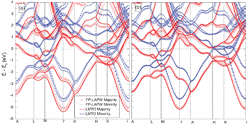Department of Physics and Astronomy: Publications and Other Research

Kirill Belashchenko Publications
First-principles study of phase stability of Gd-doped EuO and EuS
©2011 American Physical Society
Abstract
Phase diagrams of isoelectronic Eu1−xGdxO and Eu1−xGdxS quasibinary alloy systems are constructed using first-principles calculations combined with a standard cluster-expansion approach and Monte Carlo simulations. The oxide system has a wide miscibility gap on the Gd-rich side but forms ordered compounds on the Eu-rich side, exhibiting a deep asymmetric convex hull in the formation enthalpy diagram. The sulfide system has no stable compounds. The large difference in the formation enthalpies of the oxide and sulfide compounds is attributed to the contribution of local lattice relaxation, which is sensitive to the anion size. The solubility of Gd in both EuO and EuS is in the range of 10%–20% at room temperature and quickly increases at higher temperatures, indicating that highly doped disordered solid solutions can be produced without the precipitation of secondary phases. We also predict that rocksalt GdO can be stabilized under appropriate experimental conditions.

